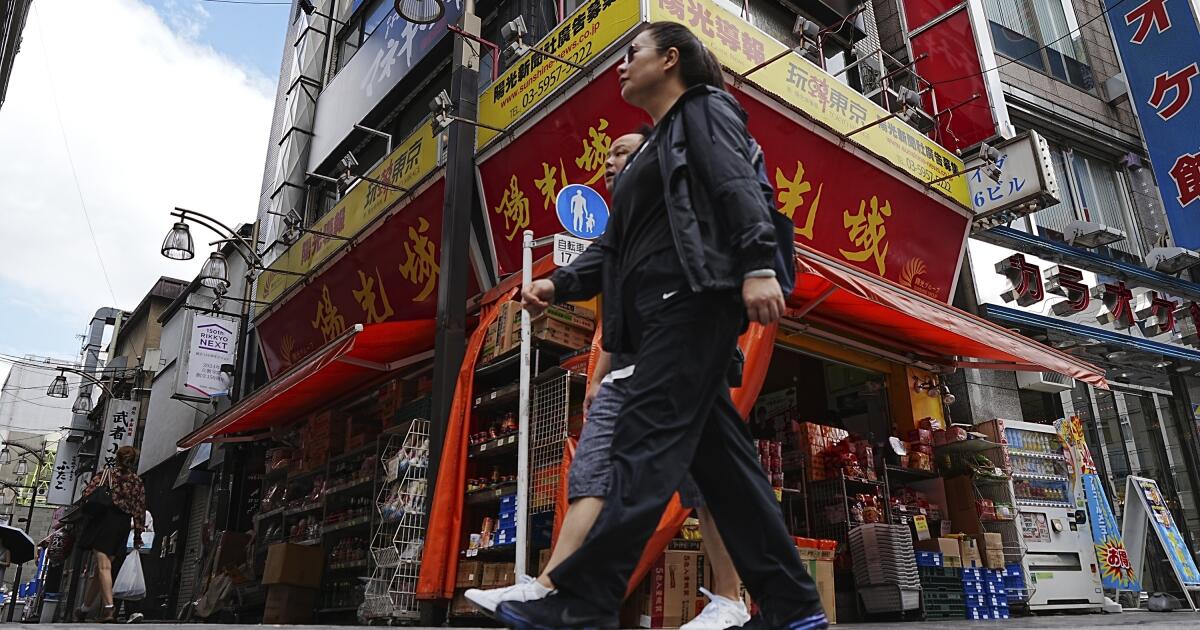TOKIO —
One by one, students and lawyers fill a classroom inside a university in central Tokyo to attend a conference by a Chinese journalist on Taiwan and democracy, taboo subjects that cannot be discussed publicly in China.
“Modern Taiwanese democracy involved struggle and bloodshed, there is no doubt about that,” said Jia Jia, a columnist and visiting professor at the University of Tokyo who was briefly detained in China eight years ago on suspicion of writing a call for the resignation of China’s top leader.
Jia is one of tens of thousands of Chinese intellectuals, investors and others who have moved to Japan in recent years, part of a broader exodus of people leaving China.
These people come from a wide variety of backgrounds and choose to leave for all kinds of reasons. Some are very poor, others are very rich. Some leave for economic reasons, as opportunities dry up with the end of the Chinese boom. Some flee for personal reasons, at a time when even limited freedoms are being eroded.
Chinese migrants reach all corners of the world, from Workers looking to create their own businesses in Mexico until Exhausted students heading to ThailandThose who choose Japan tend to be well-off or highly educated people, attracted by the country’s ease of living, cultural richness and immigration policies, which favour highly-skilled professionals, with less resistance to immigration compared to what is sometimes seen in Western countries.
Jia had originally intended to move to the United States, not Japan. But after experiencing the coronavirus outbreak in China, she was in a hurry to leave and her application for a U.S. visa had stalled. So she opted for Japan.
“In the United States, illegal immigration is particularly controversial. When I went to Japan, I was a little surprised. I found that their immigration policy is actually more relaxed than I thought,” Jia told The Associated Press. “I found that Japan is better than the United States.”
It is difficult to enter the United States these days. Tens of thousands of Chinese were detained at the US-Mexico border last year, and Chinese students have been questioned at customs as trade frictions fuel suspicions of possible industrial espionage. Some US states have passed laws restricting Chinese citizens from purchasing certain properties.
“The US is excluding those Chinese people who are more like-minded, who share its values,” said Li Jinxing, a Christian human rights lawyer who moved to Japan in 2022.
Li sees parallels with what happened a century ago, when Chinese intellectuals such as Sun Yat-sen, the founding father of modern China, came to Japan to study how the country was modernizing so rapidly.
“On the one hand, we hope to find inspiration and guidance in history,” Li said, referring to himself and other like-minded Chinese living in Japan. “On the other hand, we also want to see what a democratic country with the rule of law is like. We are studying Japan. How its economy works, its government.”
Driven by low birth rates and an aging population, Japan has softened its once-rigid stance against immigration over the past decade. Foreigners now make up about 2 percent of its 125 million people. According to the Tokyo-based National Institute of Population and Social Security Research, that number is expected to rise to 12 percent by 2070.
Chinese make up the largest number of recent arrivals, totaling 822,000 of the more than 3 million foreigners living in Japan last year, according to government data. The figure was 762,000 the year before, and 649,000 a decade ago.
In 2022, China’s “zero-COVID” policies prompted many of the country’s young or more affluent citizens to leave. There’s even a commonly used word for it: “runxue,” which uses the English word “run” to evoke “fleeing” to places deemed safer and more prosperous.
For intellectuals like Li and Jia, Japan often offers greater freedoms than the increasingly repressive regime of Chinese leader Xi Jinping. But for others, like wealthy investors and businessmen, Japan offers something more: property protections.
According to a report by investment firm Henley & Partners, nearly 14,000 millionaires left China last year, the most of any country in the world, with Japan being one of the most popular destinations. One of the main reasons is concern about the safety of their assets in China or Hong Kong, said Q. Edward Wang, a professor of Asian Studies at Rowan University in Glassboro, New Jersey.
“The protection of private property, which is the cornerstone of a capitalist society, does not exist in China,” Wang said.
The depreciation of the yen makes buying property and other assets in Japan a bargain.
And while Japan’s economy has stagnated, China’s once-booming economy is also in a rut. The property sector is in crisis and stock prices have plummeted to levels they were at in the late 2000s.
“If you are just going to Japan to save your money,” Wang said, “then you will definitely enjoy your stay in Japan.”
Digital entrepreneurs are among those leaving China following the Communist Party’s crackdown on the tech industry. They include billionaire Jack Ma, founder of e-commerce giant Alibaba, who has accepted a teaching position at Tokyo College, part of the prestigious University of Tokyo.
So many wealthy Chinese have bought apartments in Tokyo’s luxury skyscrapers that some areas have been dubbed “Chinatowns” or “Digital Chinatowns,” a nod to the work of many of their owners in high-tech industries.
“Life in Japan is good,” said Guo Yu, an engineer who took early retirement after working at ByteDance, TikTok’s parent company.
Guo is not concerned about politics. He loves Japan’s snowy winters and is a “super fan” of its beautiful hot springs. He has homes in Tokyo, near a ski resort and near a spa. He owns several cars, including a Porsche, a Mercedes, a Tesla and a Toyota.
In Tokyo, Guo is keeping busy with a social media startup and a travel agency specializing in “onsen,” Japan’s hot springs. Most of his employees are Chinese.
Like Guo, many Chinese people moving to Japan are wealthy and educated. And with good reason: Japan remains unwelcoming to refugees and many other types of foreigners. The government has been strategic in deciding who it allows to stay, generally focusing on people who fill labor shortages in factories, construction and elderly care.
“It is crucial that Japan becomes an attractive country for foreign talents so that they choose to work here,” Japanese Prime Minister Fumio Kishida said earlier this year as he announced efforts to relax Japan’s severe immigration restrictions.
That kind of opportunity is exactly what Chinese ballet dancer Du Hai says he has found. Leading a class of a dozen Japanese students at a suburban Tokyo studio on a recent weekend, Du was demonstrating positions and turns to women dressed in leotards and pointe shoes.
Du was drawn to Japan’s huge ballet scene, packed with professional companies and talented dancers, but he was concerned by warnings he received about Japanese hostility.
It turned out to be false, he said with a laugh. Du is now considering obtaining Japanese nationality.
“Of course, I really enjoy living in Japan now,” he said.


